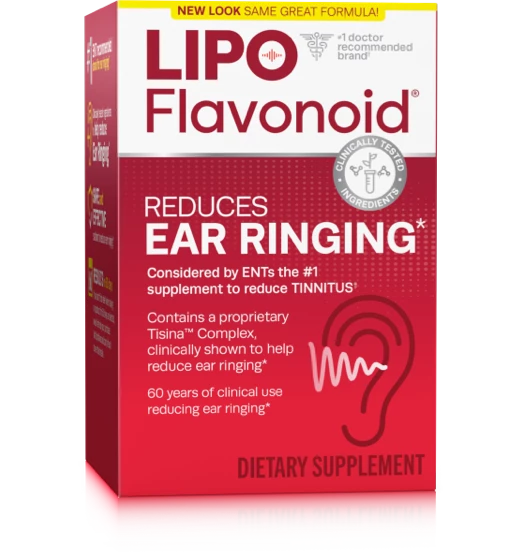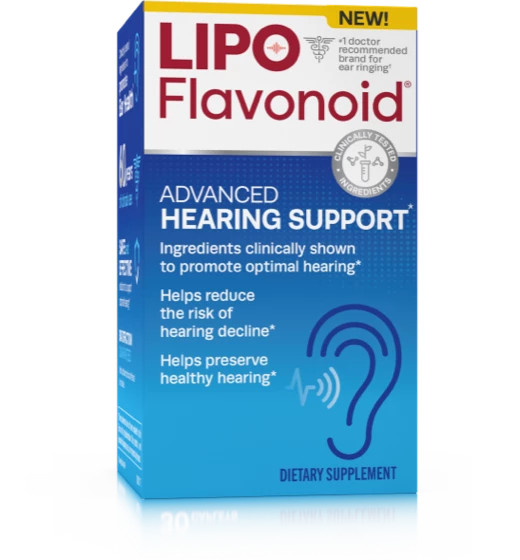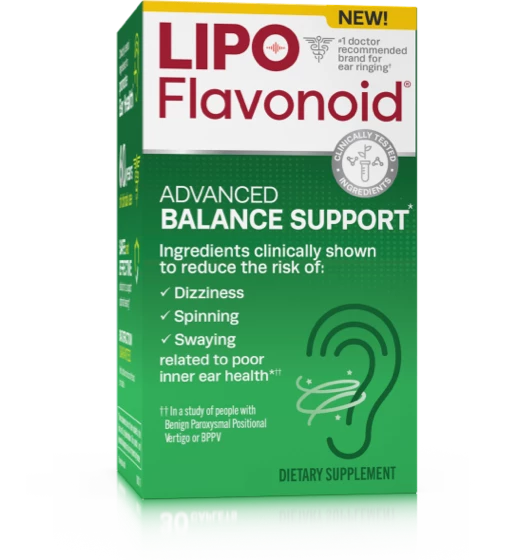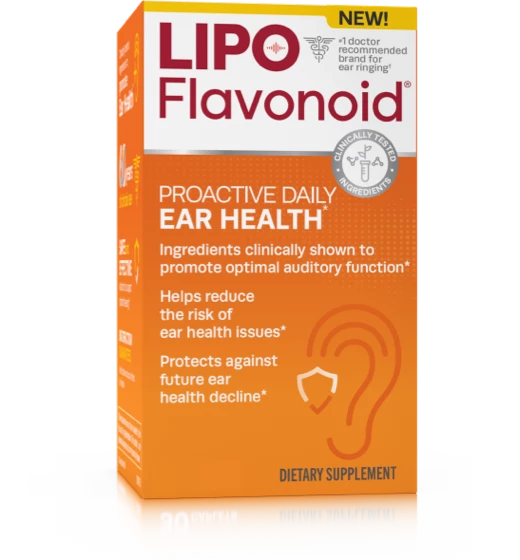- Products
- Science
-
Resources
- Tinnitus Resources
- What is tinnitus?
- Causes of tinnitus
- Tips for managing tinnitus
- Prepare for your doctor's visit
- PTSD and tinnitus
- Tinnitus FAQs
- Hearing Loss Resources
- What is hearing loss?
- Degrees of hearing Impairment
- Types of hearing loss
- Causes of hearing loss
- Treatment options for hearing loss
- Buy Now
- Coupons
- Test Your Hearing
- Test Your Hearing
- Healthcare Professionals
Ear RingingResources
What Does Tinnitus Sound Like?
Tinnitus, or ringing in the ears, is a continuing perceived sound where no external source is present. It may be in one or both ears. It is considered subjective since only the person who has the condition can actually hear it. Individuals with tinnitus sometimes describe the sound as a high-pitch whistle. Other individuals describe the sound as buzz, chirp, whoosh or pulse. Pitch is also variable. The consistent characteristic is that the ‘sound’ is constant and relentless. The best characterization is that ringing in the ears is an indication of a possible issue in the inner ear or auditory system.
The Sounds of Tinnitus
Causes of Tinnitus
People from all over the country and all walks of life experience tinnitus or disturbing “ringing” in the ears. And while you are more at risk for tinnitus if you are older, a male, in the military, or a smoker, the condition also strikes many women, young people, and non-smokers, too.
There’s not yet a cure for tinnitus, but there are ways you can help to prevent your tinnitus from getting worse and to manage your symptoms so they are less disruptive. Understanding the common causes of tinnitus is a good place to start.
Loud noises
Extreme volumes, especially if you’re repeatedly exposed to them, can damage and weaken the cells in your ears and lead to hearing loss and tinnitus. Nearly one-third of all tinnitus cases can be traced back to noise damage.2 At work, at home, at leisure – the volume of life is sometimes cranked up way to high for the health and longevity of the delicate structures in our ears. Those who work in factories, the military, construction, or the music industry are at particular risk. Crowded places, concerts, sporting events, recreational shooting, and listening to loud music with earbuds can also put ears in danger.1,3
Aging
Among the many effects of aging is gradual hearing loss, usually starting at about age 60. Hearing loss can cause tinnitus. Also, with age, the little bones in our ears can stiffen – affecting hearing and leading to tinnitus. And, with the passage of time, we can accumulate more noise-related ear damage.1,3
Medications
Certain medications can initiate tinnitus or make it worse, even if they haven’t before. Medications linked to tinnitus include aspirin (in high doses), non-steroidal anti-inflammatory drugs (NSAIDs), antibiotics, cancer medicines, diuretics (water pills), and some antidepressants. NEVER, however, stop taking any medications without talking to your doctor first. The risks of stopping a medication may far exceed any potential benefit.1,3
Earwax
Earwax helps clean, protect, and lubricate our ears. And, usually, just by moving our jaws in day-to-day life, we’re able to do all the earwax removal necessary. No cotton-tipped swabs required! Sometimes, though, too much earwax can cause pain, tinnitus, or hearing loss. DO NOT try to solve this problem on your own. Excessive earwax needs to be removed by a healthcare professional to avoid damage to the delicate cells and structures responsible for your hearing.1,3
Medical conditions
A wide range of medical issues can lead to tinnitus. These may include: nasal congestion from a severe cold or sinus infection, barotrauma (due to extreme changes in air or water pressure such as with scuba diving), traumatic brain injury (especially after exposure to an explosive blast), Meniere’s disease (an inner ear disorder), temporomandibular joint (TMJ) problems, head or neck injuries, dental issues, certain cancers, and blood vessel disorders (such as narrowed arteries, high blood pressure, or turbulent blood flow.)1,3
Tips for
Managing Tinnitus
Tinnitus and the bothersome ringing in the ears is in no way fun. Whether you have suffered from it for years or it is a new obstacle in your life, there are ways to help manage your symptoms. Here are 6 tips to manage your tinnitus:
-
Understand Your Tinnitus
- Know that tinnitus is not usually a sign of an ongoing medical condition.
- See a specialist, whether it be an audiologist or an ear nose and throat center, to make sure what you are experiencing is in fact tinnitus and not another condition.
- Let your medical professional know what medications you are on to help eliminate possible causes. Some medications can cause or aggravate ringing in your ears. Sometimes a medicine you may have taken for years without incident will trigger an episode. Even ordinary aspirin will provoke this reaction.
- Track your triggers: Keep a record of your tinnitus symptoms, their severity, your diet, and other factors so you can notice patterns, trends, and potential tinnitus triggers. Some things to consider may be potential effects (positive or negative) of caffeine, alcohol, nicotine, salt, sugar, artificial sweeteners, eggs, stress, sleep, or exercise on your symptoms. Obviously if you think something is making your tinnitus worse, try to avoid it and see what happens.
-
Protect Your Ears
- In military or industrial careers you can be exposed to loud noises so you will need to have protection. Invest in a pair of ear plugs or noise canceling headphones to protect your ears and help avoid aggravating your tinnitus.
- Crowded spaces and concerts can have very high decibel levels and damage your hearing and cause ringing in your ears. Try to avoid loud events or consider wearing ear protection to avoid further damage.
-
Stress, sugar and salt in your diet can trigger tinnitus
- Try to reduce stress levels as this can make your condition worse.
- Keep a journal of your stresses and work to reduce or eliminate them one by one.
- Some foods will aggravate your tinnitus. Pay attention to what you are eating and if it causes your condition to worsen. Things such as nicotine, salt, artificial sweeteners, sugars, alcohol and other foods can trigger tinnitus.
-
Stay Positive
- Staying in a positive state of mind will help, don’t make negative predictions about your condition. There are tools to help, such as Lipo Flavonoid® Ear Ringing Relief!
- A lot of sufferers will get used to their tinnitus and notice it less and less.
- Consider your attitude as part of your treatment, staying positive will help you heal faster and keep your body healthy.
-
Seek Out Support
- Find people that know what you’re going through. Their understanding of your condition will help you feel supported and that you’re not alone.
- A licensed therapist or psychologist can help you to learn new coping skills so you can better manage your tinnitus symptoms and the impact they have on your life. Support groups can give you cathartic opportunities to share your experiences and learn tips from fellow tinnitus sufferers.
- Find a support group online or in your community. Joining a group can help you sort through information and learn coping strategies.
- Help your family and friends understand more about your condition and ask for their support and understanding.
-
Try a nutritional supplement to support ear health
With consistent use as directed, the nutrients in Lipo Flavonoid Ear Ringing Relief have been shown to improve the symptoms of tinnitus in some people.4-10 According to a recent survey of 250 ear, nose and throat specialists (otolaryngologists), 100% recommend nutritional supplements to their tinnitus patients and 85% recommend the brand Lipo-Flavonoid® specifically.11
How Do You Pronounce Tinnitus?
Remember that song “Let’s Call the Whole Thing Off?” from the 1937 Fred Astaire and Ginger Rogers movie Shall We Dance? You know… the one that plays on how accents and regional dialects can affect the pronunciations of words like “either,” “neither” and “tomato.” Still no idea? Check out the video here. Funny thing, the pronunciation of “tinnitus” is just like that song. Depending upon where you’re from and even on your profession, you may say tinnitus differently than someone else.
The British and healthcare professional pronunciation tends to sound like “TIN-ni-tus.” Listen.
While the American and layperson pronunciation often sounds like “ti-night-tus” or “tin-NYE-tus.” Hear it here.
So which one is right?
Neither, either. Even the American Tinnitus Association (ATA) can’t decide. “Both pronunciations are correct,” they say. But, for the record, they use “ti-NIGHT-us.”
Whichever pronunciation sounds right to you, the ringing, buzzing, whistling, whooshing in your ears probably doesn’t and we want to help.
Prepare for Your
Doctor’s Visit
A little preparation before you leave home will help make sure you get all of the information you need at your next doctor appointment. Download a full toolkit, print it and fill out what you can — even your doctor will be impressed with how prepared you are!
What information should I bring?
Having information on hand when you arrive will help keep the appointment moving and help the doctor better evaluate your current symptoms.
- Names of medications, supplements and vitamins you are taking: Some can actually cause tinnitus and your doctor will be able to help identify those.
- Symptom diary: Write down your symptoms with as much detail as you can (sound, pitch, frequency) for at least a week before your visit – the longer, the better as this helps identify patterns. Try to record details about your diet, activities, environment and stress level as well, since these can all contribute to tinnitus.
- Medical history: Even if it’s on file at your doctor’s office, he or she may not be current on your history. It always helps to have it handy.
- Lipo Flavonoid® product information: Some doctors have never heard of our product, so bringing a fact sheet with you will help them evaluate the ingredients and recommend if Lipo Flavonoid is the right supplement for you to try.
Questions to ask your doctor – “why does my ear randomly ring?”
Being informed is the best first step in finding relief. If you have any questions that weren’t answered on our site or aren’t included in the list below, be sure to jot them down on your checklist.
- Could any of my medications be contributing to my tinnitus?
- How can I improve my ability to fall and stay asleep?
- How can I best explain my symptoms to my family and friends so they understand what is happening?
- Are you familiar with Lipo Flavonoid products?
- Is there any reason I couldn’t take Lipo Flavonoid to see if it helps alleviate my symptoms?
- Do you have any samples of Lipo Flavonoid products?
- What steps can I take to minimize the ringing in my ears?
- Is there anything I can do to help prevent the ringing in my ears from getting worse?
How do doctors test for tinnitus?
While there is no one specific test used to diagnose tinnitus, there are several tests that could help eliminate other serious conditions that could be contributing to your ear ringing.
- Electrocochleography test: Records electrical activity in your inner ear
- Vestibular (balance) tests: Tests your balance to detect inner ear disturbances
- MRI: While not always necessary, this test can help rule out other serious inner ear conditions
- Audiological exam: Test that measures the your overall hearing health because tinnitus is so often caused by hearing loss
PTSD and Tinnitus
There have been studies linking PTSD and tinnitus, but one in particular really investigated into the connection. Marc Fagelson, Ph.D., a professor of audiology at East Tennessee State University, became intrigued when results came back that his patients suffering from tinnitus assessed themselves as being more distressed from it than other patients. This is when Fagelson came to determine that all of the patients shared something unique known as PTSD.
“The first inkling I had that there might be some kind of relation came from clinical experience observing the patients I saw in the VA clinic. The ones who had PTSD almost invariably were more bothered by their tinnitus than the patients who didn’t.” – Marc Fagelson, Ph.D.
In another study involving 300 veterans over a course of four years from the American Journal of Audiology, it was found that “34% of patients initially enrolled at the VAMC tinnitus clinic also carried a diagnosis of PTSD.” To add to that, anxiety from PTSD was discovered to make the tinnitus more severe.
PTSD and Tinnitus Options
- Both PTSD and tinnitus are conditions that can’t be cured. However, they can be managed. Lipo Flavonoid® Ear Ringing Relief is a natural bioflavonoid product that has been used and studied extensively for decades. It is a safe, often effective product that can provide relief to people who suffer with ringing in the ears, also known as tinnitus.
- Tinnitus is a condition that has a number of contributing factors and causes, and there is no known treatment that will bring complete relief to all sufferers. However, Lipo Flavonoid Ear Ringing Relief has been shown to provide relief for some people who suffer from tinnitus. While Lipo Flavonoid Ear Ringing Relief may not work for everyone, we stand behind our product, our history and our results. If you don’t find relief from ringing in the ears with use of Lipo Flavonoid Ear Ringing Relief as directed for 60 days, we will refund your purchase. For more information about our money back guarantee, click here.
Sources
Tinnitus FAQs
-
No. Ringing in the ears is believed to have many possible causes or contributing factors but it is not a disease. In some cases occupational exposure to loud noises is directly related to ringing in the ears. In other cases certain medications (including aspirin and ibuprofen) are thought to initiate or exacerbate tinnitus. In still other cases none of these factors is present, but ringing in the ears still occurs. Ringing in the ears is sometimes associated with impacted cerumen (ear wax) or other symptoms of inner ear disturbance such as dizziness or vertigo.
-
Otolaryngologists, also known as Ear, Nose and Throat specialists (ENTs) are the most familiar with ringing in the ears.
-
Ringing in the ears may be temporary… or permanent. It is important to find mechanisms to improve quality of life for as long as tinnitus is an issue.
-
It is generally acknowledged that there is no “cure” for ringing in the ears. However, there is general agreement in the medical community that about 80% of patients seeking medical assistance are able to improve their quality of life by following a regimen which avoids environmental and therapeutic triggers of the symptoms while providing nutritional support for healthy microcirculation of the inner ear. Many ENT specialists regularly support and employ Lipo Flavonoid as a therapeutic option where ringing in the ears is involved.* (*Source: April 2018 survey)
-
The human ear is an enormously complex system which depends on tiny hair-like sensors in the inner ear to convert external vibrations into recognizable sounds. Inflammation, irritation or trauma can be very disruptive in the inner ear. The blood vessels which serve this area are extremely small, so much so that physicians sometimes refer to ‘microcirculation’ when talking about blood circulation in the inner ear. Various hypotheses have been offered by clinical observers to explain the mechanism by which the micronutrient support provided by Lipo Flavonoid provides benefit to many tinnitus sufferers.
-
Keep the following things factors consistent:
- Diet
- Caffeine
- Alcohol
- Prescription medications
- Other medications and supplements
- Sleep schedule
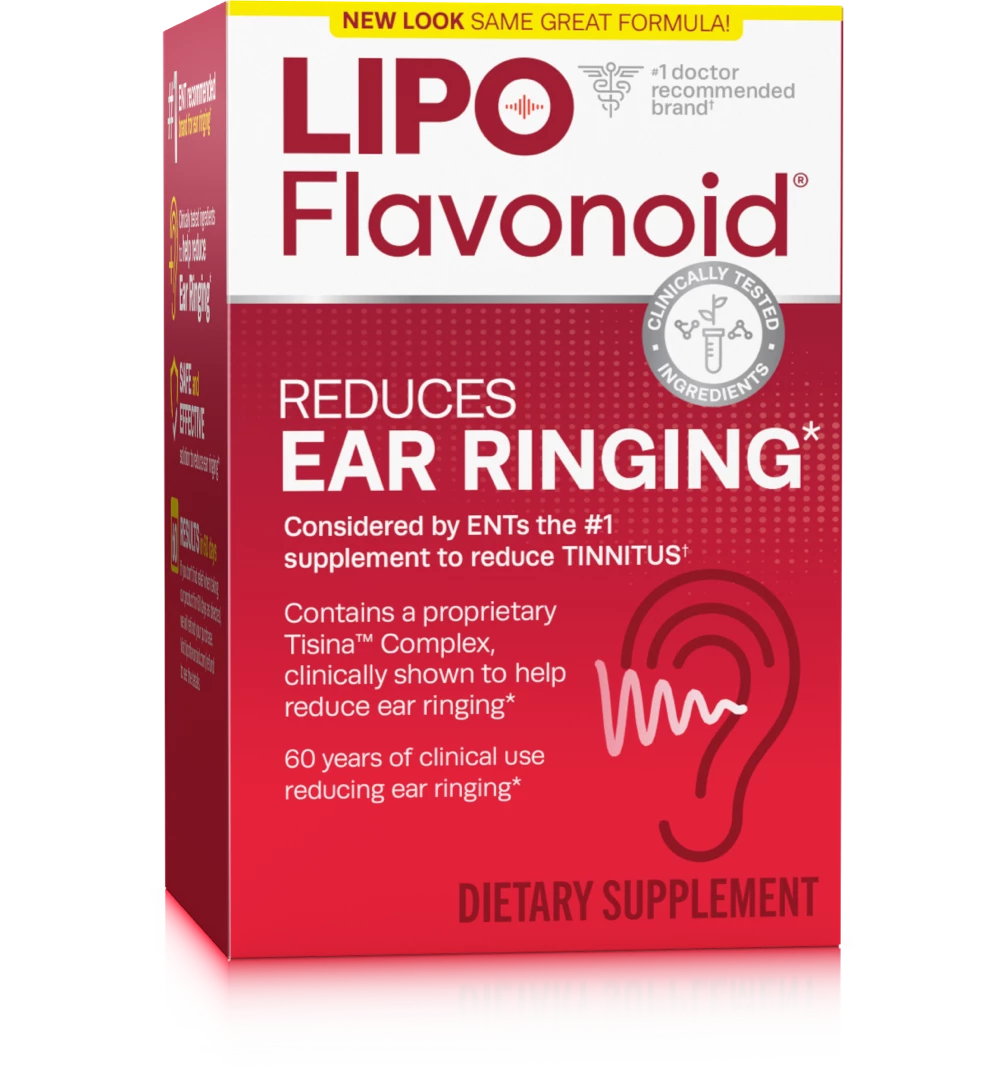
Ear ringing?
Lipo Flavonoid Ear Ringing Relief is the #1 recommendation of ENT doctors for their patients with ringing in the ears*
Learn more*These statements have not been evaluated by the Food and Drug Administration. These products are not intended to diagnose, treat, cure or prevent any disease.
*Survey data on file
REFERENCES:
- April 2018 Survey. Clarion Brands Inc. data on file.
- Williams H, Hedgecock L. Citrus Bioflavonoids, Ascorbic Acid and Other B-vitamins in the Treatment of certain types of neurosensory deafness a preliminary report. Staff meeting of the Mayo Clinic (1962).
- Tinnitus Overview. Mayo Clinic website http://www.mayoclinic.org/diseases-conditions/tinnitus/basics/definition/con-20021487. Accessed Sept. 7, 2016.
- Understanding the Facts. American Tinnitus Associations website https://www.ata.org/understanding-facts. Accessed Sept. 7, 2016.
- Slattery WH, Fayad JN. Medical treatment of Meniere's disease. Otolaryngologic Clinics of North America 1997; 30:1027-37.
- Kumar S, Pandey AK. Chemistry and Biological Activities of Flavonoids: An Overview. The Scientific World Journal. 2013;2013:162750. doi:10.1155/2013/162750.
- Fetterman BL, Saunders JE, Luxford WM. Prognosis and treatment of sudden sensorineural hearing loss. Am J Otol 1996; 17:529-36.
- Arenberg I, Bayer R. Therapeutic Options in Meniere’s Disease. Arch Otolaryngol 1977;103: 589-93.
- Shaia F, Sheehy J. Sudden sensori-neural hearing impairment: a report of 1,220 cases. Laryngoscope 1976; 86:389-98.
- Herschberg S. Meniere’s disease. J Am Osteopathic Association 1974; 73:540-6.
- Wolfson R. Treatment of Meniere’s disease. Modern Treatment (1969) 6,3, 553-567.
- Rubin W. Vestibular suppressant drugs. Arch Otolaryngol 1973; 97:135-8

